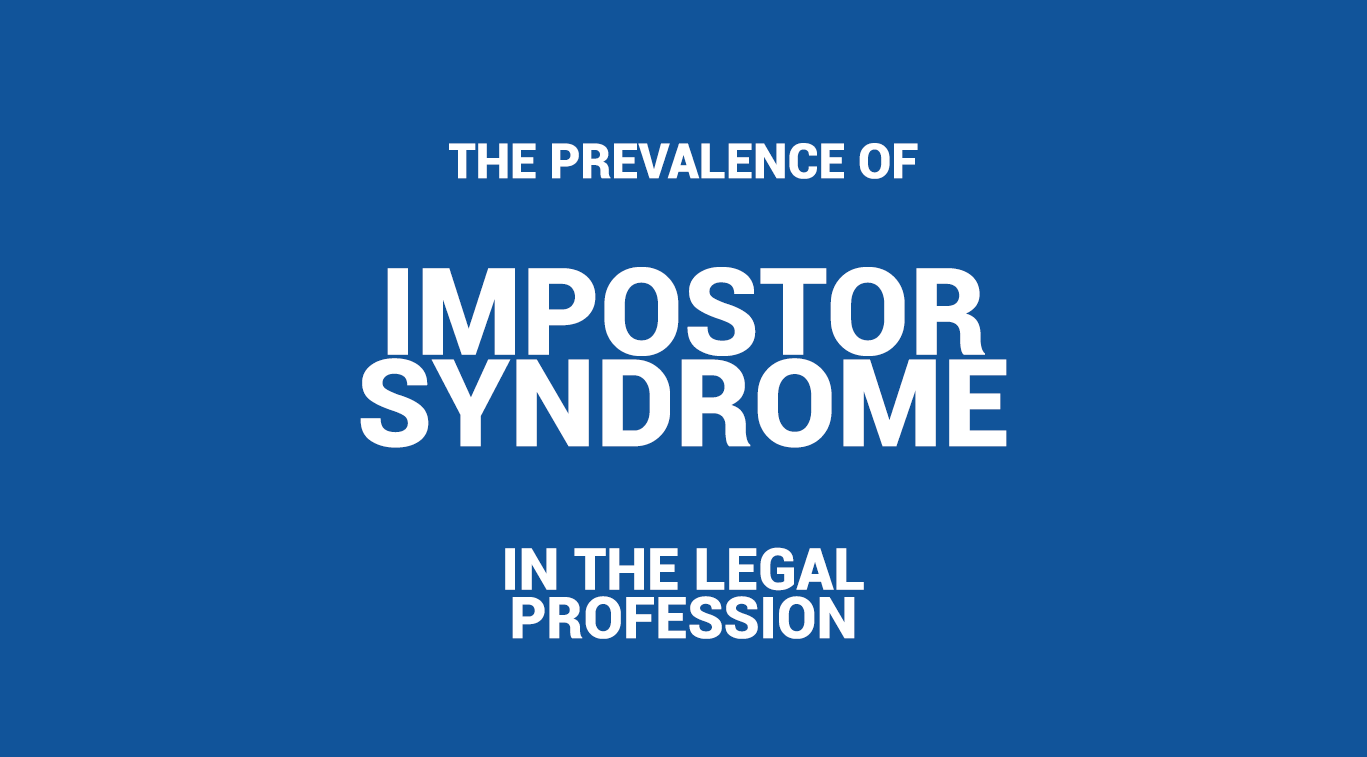The Prevalence of Impostor Syndrome in the Legal Profession

Written by Fatima Freifer
Blogger

What is impostor syndrome?
The phenomenon of imposter syndrome is not new. Imposter syndrome is common in many professions, including the legal field. The etymology of the term stems from the efforts of Drs. Clance and Imes who coined the term “Imposter Syndrome” in the late 1970s after years of counseling highly accomplished professors, administrators, and students who were uncomfortable at the thought of supposedly being exposed as a fraud. [1] These groups of professionals frequently attributed their success to excessive overwork or relationships that shielded or elevated them.
Imposter Syndrome makes it difficult for people to internalise their accomplishments. Perfectionism, black-and-white thinking, and intense fear of rejection and failure are commonly associated with (and exacerbated by) it. These thought patterns combine to create an ideal storm of insecurity, anxiety, and stress. Lawyers, particularly those in solo practices or small firms, can become paralysed by these thoughts, and women and minorities are disproportionately affected.
As the legal profession seeks to embrace diversity and promote belonging for all in the twenty-first century, the opening up of conversations that allow voices to be heard has become more ingrained.
Imposter syndrome is defined as “the persistent inability to believe that one’s success is deserved or has legitimately been attained as a result of one’s own efforts or skills.” [2]
The fear of not being enough – which is exactly what impostor syndrome is – can be a sneaky source of stress. It stems from the stories we tell ourselves, as do most sources of mental stress. Every day, we ruin what should be the joy of celebrating success by looking back at the fictitious threat seemingly in the not too far distance. [3]
How common is impostor syndrome within the legal industry?
According to the Junior Lawyers Division, more than 80% of young solicitors have experienced IS at some point in their careers. Females under the age of 34 appear to be more susceptible to impostor syndrome at work than men. [4]
The profession is synonymous with high standards, a lack of tolerance for mistakes, and a desire to avoid risk. Impostor syndrome is common in overachievers and perfectionists, so it’s no surprise that many lawyers experience signs of lawyer burnout and believe they are intellectual frauds. [5]
Data analytics for lawyers help form the notion that Impostor syndrome not only has a negative impact on mental and physical well-being, but it also has a negative impact on performance, productivity, and proactivity. It can prevent one from reaching their full potential by eroding self-confidence and self-esteem. Most lawyers have a desire to strive for perfection, so when things become particularly difficult, they begin to doubt their own abilities and become very concerned about being caught out, not knowing what they are doing, or, worse still, being seen as incompetent or a failure. [6]
The practice of law, whether in litigation or transactional work, is complicated and bears little resemblance to what is taught in law school.
When a newly qualified lawyer is placed in a hectic workplace with little experience in the implementation of their field of law to a real life setting, panic can set in. For example, an attorney who can write a perfect contract can be perplexed by client counseling. Even the most astute and engaging students require mentorship or shadowing to instill a sense of confidence in their approach and to adjust to the processes required within the workplace.
Anxiety can cause people to believe they are “imposters” because they don’t know as much as they should, leaving them conflicted between guilt and anxiety about being labeled as such. [7]
Lawyers as a group are particularly vulnerable to low self-esteem at work. Because of the nature of the legal profession, lawyers must always be organised, perfect, and flawless in all aspects of legal operations. Senior lawyers frequently hope to maintain the appearance of being “flawless practitioners,” and they rarely admit their flaws to the public. This creates a negative image for new associates—they feel every mistake they make will be magnified. Practice case management systems can help to eliminate the fear of making errors with the utilisation of efficient softwares to deal with more mundane and manual tasks; similarly paperless document storage and software used by law firms are arguably termed software for good causes within the industry as they actively eliminate the scope of errors made and in turn help ease the symptoms of impostor syndrome. [8]
Conclusion
Impostor syndrome has a negative impact on people’s work and personal lives in a variety of ways. It fosters self-doubt and low self-esteem, and it stifles career advancement by preventing people from venturing outside their comfort zone to take on more challenging roles and projects. It impedes leadership and management at the highest levels, impeding decision-making and innovation. [9]
Furthermore, it has an impact on mental health, as overworking and mental burnout cause stress, anxiety, and feelings of isolation. This is especially important in the current climate with the onslaught of remote legal work. Practice areas need to take this into account within the work environment and work with employees to help eliminate this guilt in order to create an environment that is more inducive to a positive work pattern. [10]
References
[1] Stop, imposter! Imposter syndrome in the legal profession, Anita Gohil-Thorp, 06 Jul 2021
https://www.lawsociety.org.uk/topics/blogs/stop-imposter-imposter-syndrome-in-the-legal-profession
[2] Why lawyers are more likely to have imposter syndrome (and how to solve it), Connor Colson, March 2021, https://www.linkedin.com/pulse/why-lawyers-more-likely-have-imposter-syndrome-how-solve-colson
[3] How to combat impostor syndrome in your legal career, https://www.robertwalters.co.uk/career-advice/latest-legal-research/how-to-combat-impostor-syndrome-in-your-legal-career.html
[4] Imposter syndrome in the legal profession and how it impacts your career, Cameron Vincent, 12.08.2021 https://www.moorebarlow.com/imposter-syndrome-in-the-legal-profession-and-how-it-impacts-your-career/
[5] Impostor Syndrome and How It Impacts Your Career Success
https://www.lawyer-monthly.com/2020/05/impostor-syndrome-and-how-it-impacts-your-career-success/
[6] The Legal Process of Signing Contracts in UK Law and the Effect of Covid, Fatima Freifer https://goodlawsoftware.co.uk/the-legal-process-of-signing-contracts-in-uk-law-and-the-effect-of-covid
[7] Impostor syndrome – how to conquer your fears, District Judge Helen Conway, 7 October 2019 https://www.lawgazette.co.uk/features/impostor-syndrome-how-to-conquer-your-fears/5101651.article
[8] Virtual Legal Consultations & Ethical Considerations, Fatima Freifer https://goodlawsoftware.co.uk/virtual-legal-consultations-ethical-considerations
[9] Imposter syndrome and the legal sector, Matthew Dow, 11/09/2019 https://www.lawcareers.net/Explore/BlogPost/Matthew-Dow/Imposter-Syndrome-and-the-Legal-Sector
[10] Managing Work Stress in the Holidays, Fatima Freifer https://goodlawsoftware.co.uk/managing-work-stress-in-the-holidays








